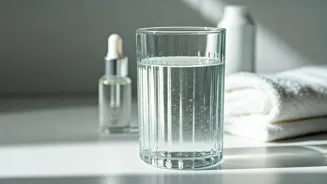Stay Hydrated
Hydration is vital for healthy skin, acting like a natural moisturizer from the inside out. Adequate water intake helps maintain skin elasticity, making
it appear plump and reducing the appearance of fine lines and wrinkles. Dehydration can lead to dry, flaky skin that is more prone to irritation. Drinking enough water helps your skin function better, supporting cell turnover and keeping it healthy and radiant. Make it a point to drink plenty of water throughout the day to keep your skin looking its best. This internal care is as important as any external treatment, and it contributes significantly to overall skin health and vitality. Aim for at least eight glasses of water daily, or more if you are active or live in a warm climate. Additionally, consider hydrating foods like fruits and vegetables that have high water content to supplement your water intake. This approach ensures that your skin receives the necessary hydration to stay healthy and glowing.
Eat Skin-Friendly Foods
The foods you eat significantly impact your skin health. A diet rich in fruits, vegetables, and healthy fats provides essential nutrients that support skin health and function. Antioxidant-rich foods such as berries, spinach, and nuts can protect your skin from damage caused by free radicals, which can accelerate aging. Healthy fats, found in avocados and fatty fish, help maintain skin's moisture barrier and reduce inflammation. Eating foods high in vitamins and minerals promotes collagen production, which is essential for skin elasticity and firmness. Including a variety of nutrient-dense foods in your daily diet directly contributes to healthier, glowing skin. It helps keep skin strong and resilient, with a natural glow. Make sure you're incorporating foods from all of the food groups to cover all of your skin's needs.
Gentle Cleansing
Harsh products can strip your skin of its natural oils, leading to dryness, irritation, and even breakouts. Choose cleansers that are mild, fragrance-free, and specifically designed for your skin type. Avoid products containing alcohol, sulfates, and strong detergents, as these can damage your skin's protective barrier. Use lukewarm water and gently massage the cleanser into your skin. Avoid over-washing, as excessive cleansing can also lead to dryness and irritation. This can disturb your skin's natural moisture balance. Find a gentle cleanser that works for your skin type and use it twice a day to clean your skin properly without causing any damage. Washing your face with this type of product can help remove impurities and leave your skin feeling fresh and healthy.
Moisturise Regularly
Moisturizing helps replenish and lock in moisture, crucial for maintaining healthy skin. Use a moisturizer appropriate for your skin type—a light, oil-free option for oily skin, or a richer cream for dry skin. Apply moisturizer twice daily, especially after washing your face or showering. This will ensure your skin remains hydrated throughout the day. Applying moisturizer also helps protect your skin from environmental stressors, such as pollution and harsh weather. Consistency is key; regular moisturizing contributes to a supple and glowing complexion. Integrating this routine into your daily regimen is a simple yet highly effective way to boost your skin's health and radiance. Be sure to choose products that are suitable for your skin's specific needs.
Avoid Over-Washing
Washing your face too frequently can remove essential oils, leading to dryness, irritation, and potential breakouts. Stick to cleansing your face twice daily – once in the morning and once at night. Avoid excessive scrubbing, which can damage the skin's barrier and cause inflammation. If you tend to wash your face more often, use milder, hydrating cleansers. In cases where you sweat heavily or come into contact with irritants, a quick rinse with lukewarm water is usually sufficient. By reducing the frequency of cleansing, you allow your skin to retain its natural moisture and maintain a healthy balance. This helps your skin to stay healthy and not be dry or irritated.
Wash Before Bed
Washing your face before bed is vital for removing the day's impurities. Throughout the day, your skin accumulates dirt, oil, and pollutants, all of which can clog pores and lead to breakouts and inflammation. Cleansing ensures that these impurities are removed, allowing your skin to repair itself overnight. Skipping this step can cause skin problems. By washing your face before bed, you create an ideal environment for your skin to rejuvenate while you sleep. This simple habit helps maintain clear, healthy skin and promotes a fresh, radiant complexion. It helps prevent acne breakouts and leaves your skin feeling refreshed.
No Sharing Items
Sharing skincare items can spread bacteria, leading to breakouts, infections, and other skin issues. Avoid sharing makeup, towels, washcloths, and any skincare products. Sharing these items can transmit bacteria and cause acne and other skin problems. Using your own personal items reduces the risk of transferring germs and maintaining clear, healthy skin. Maintaining individual hygiene is important for overall skin health. Keep your personal skincare items private. This practice helps prevent the spread of germs and skin problems.
Avoid Popping Pimples
Resist the urge to pop pimples, as this can worsen the situation. Popping pimples often pushes bacteria deeper into the skin, leading to increased inflammation, more breakouts, and potential scarring. This process can also cause painful red spots. Instead, use spot treatments containing benzoyl peroxide or salicylic acid to target blemishes. Let your skin heal naturally, or consult a dermatologist. Treating pimples at home can be risky, so be patient and give the treatments time to work. Popping pimples can lead to skin infections.
Apply Sunscreen Daily
Sunscreen is a vital component of your skincare routine. Exposure to the sun's harmful rays can cause premature aging, wrinkles, and increase the risk of skin cancer. Apply sunscreen daily to protect your skin. Choose a broad-spectrum sunscreen with an SPF of 30 or higher, and apply it generously to all exposed areas of your skin. Reapply every two hours, especially if you are spending time outdoors, or immediately after swimming or sweating. Incorporate sunscreen into your daily routine to maintain healthy, youthful-looking skin. It protects your skin from sun damage, which leads to a more radiant complexion. Make it a habit and protect your skin from harm.

















